Hong Suk Ja: Pursuing Women’s Rights in South Korea
Hong Suk Ja, a graduate from the Boston University Department of Political Science in 1958, helped create a platform for women’s rights in South Korea. Her efforts for gender equality impacted Korean society and contributed to changing the stereotypes about women in South Korea during the second half of the twentieth century.
Education
Hong was born on July 25, 1933 in Seoul.[1] She was recognized as an intelligent student and therefore given opportunities in education, which were rare for Korean women at that time. In her youth, Hong wanted to be a diplomat. Her ambition encouraged her to study harder, especially languages such as English and French.[2] Even the Korean War between 1950 and 1953 could not stop her passion for study. She entered the Dongguk University Department of Political Science and Diplomacy as an undergraduate student and graduated in 1955.[3] She was the only female student in the program.[4] After graduation, she decided to study at the graduate school of Ewha Womans University, where in 1956 she was the first student to receive a Master’s degree in politics and diplomacy.[5]
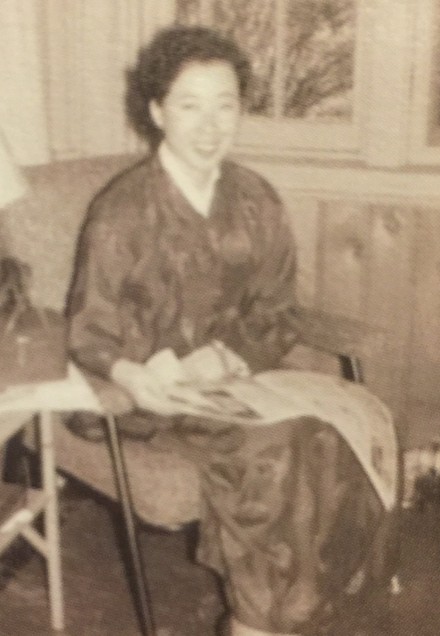
After she completed her study at Ewha Womans University, Hong desired to study in the United States. It seemed preposterous because only people of the privileged class could have opportunities to study abroad in the mid-twentieth century. Yet, Rev. Hwang Seongsu, who had studied international politics at Columbia University and met Hong at Political Diplomacy Study Group that he organized in Busan during the Korean War, convinced Dr. Edwin Wright, who was from Massachusetts but temporarily staying in Korea, that Hong should study in the United States. Dr. Wright promised financial support for Hong’s graduate study at Boston University. As a result, she went to Boston in August 1956, and earned a second Master’s degree in political science at Boston University in 1958.[6] She also married Jeon Juhwa, another Korean international student who had been living in Boston while he studied medicine.[7]
First Female Diplomat
As the time approached for Hong to give birth to her first son, Jeon Inbeom (now the Deputy Commander of the First Republic of Korea Army Command), she returned to South Korea.[8] After his birth in December 1958, she found work as an assistant to the minister of foreign affairs.[9] Yet within a year, Hong and Jeon Seongsuk were appointed as the first female Korean diplomats.[10] Initially, Hong worked in the protocol office, translating English to Korean for the wife of minister of foreign affairs as she met with the wives of ambassadors from foreign countries.[11]
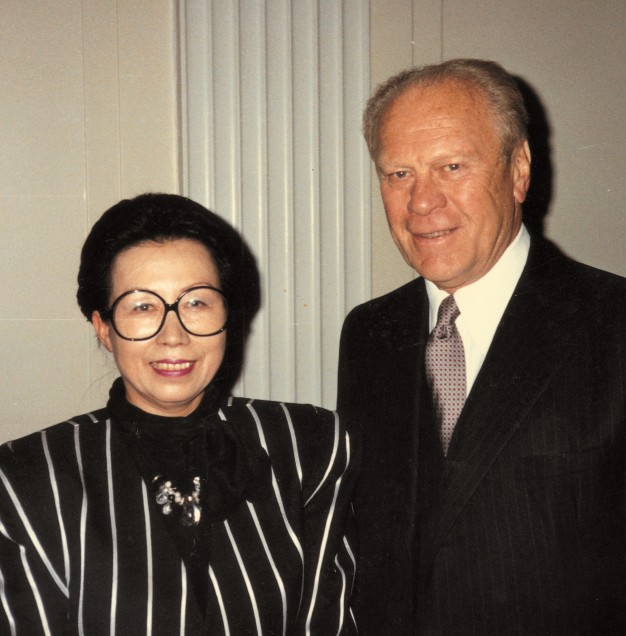
In 1962, Hong went to New York as a Carnegie Fellow at Columbia University through a program to train diplomats from developing countries. Her re-exposure to American society caused her to see Korean society differently. She became an advocate for women’s rights, and criticized Korean norms that demanded women’s endurance. As an expression of her new freedom from such standards, Hong ended her marriage.[12]
In 1965, two years after returning to Korea, Hong was appointed as a vice-consul for the Consulate General of the Republis of Korea in New York. It was a surprising appointment as she was the first female diplomat to work at the Consulate and it attracted enough attention that Korean newspapers covered the story.[13] In New York, she worked as a diplomat and also began working on a doctorate from the New School for Social Research. A change in circumstances prevented her from completing the degree in New York, but Hong eventually earned her Ph.D. from Dongguk University in 1975.
Women’s Rights and the First Korean Female candidate for the presidency
Even though Hong had long aspired to be a diplomat, she decided to quit her job in 1971 and began to work for women’s rights in Korea. This was mainly because she was troubled by discrimination against women in Korean society, an experience that she found profoundly alienating while working as a diplomat.[14]
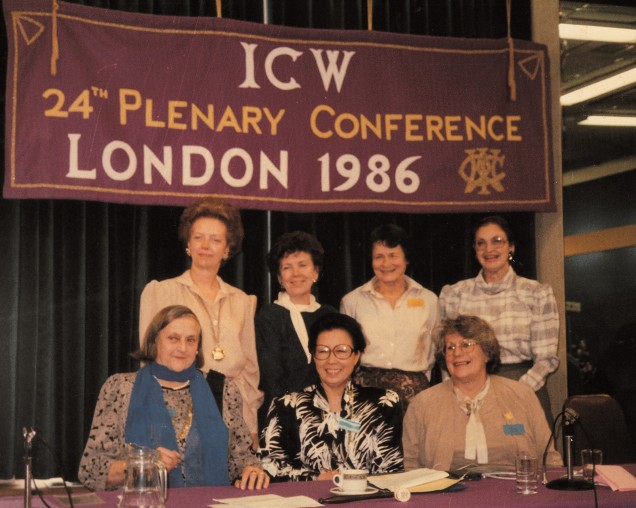
After her resignation, Hong first wrote an article in the Dong-A Ilbo to encourage Korean women to fight for their rights by actively engaging in voting.[15] She also began working at the Korean National Council of Women, which was founded by Kim Hwal-lan (Kim Helen), the first Korean president of Ewha Womans University. Eventually, Hong became the president of the organization, but at first she worked as the committee president of International Relations in the council. In that capacity she built strong relationships with representatives from other countries, and deepened her understanding of women’s rights as a global issue. It was in that role that she also acted as a bridge between the Korean National Council of Women and the International Council of Women (ICW).[16] Through that process, Hong became involved in ICW and was later elected its vice president in 1982, and its president in 1986.[17] The election of a Korean woman to the ICW presidency drew media attention and Hong became a public figure in South Korea.[18]
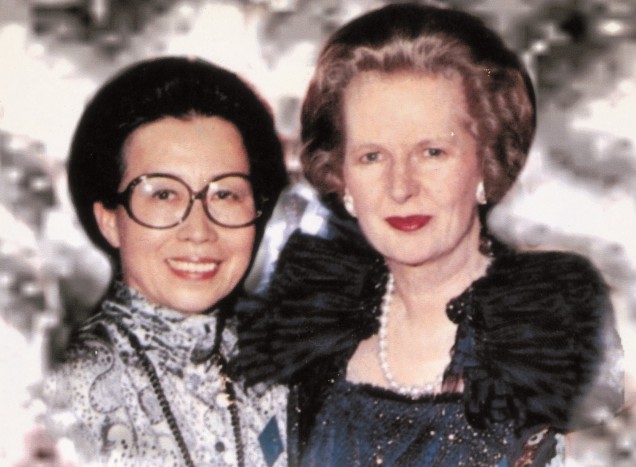
Hong Suk Ja worked for women’s rights in diverse ways. She established the New Women’s Association, which was approved by the Korean National Council of Women in 1973 as an official female association. Hong organized weekly discussions to share thoughts on women’s rights.[19] As a president of the organization, she constantly raised the profile of the issue by participating in debates on television, writing articles in newspapers, and publishing a book, Over Another Horizon (Tto hanaui Jipyeongseoneul neomeoseo).[20] In 1983, Hong also reopened Altrusa, an organization that had been closed for some time, so women could receive counseling and learn to speak up about issues important in their lives.[21] In recognition of her work, and as a sign of her success in raising women’s issues, the Korean government recognized Hong’s achievements by bestowing upon her the “Order of Civil Merit, Camellia Medal” in 1983. In 2008, the Korean National Council of Women gave her its highest honor: the “Helen Kim award.”[22]
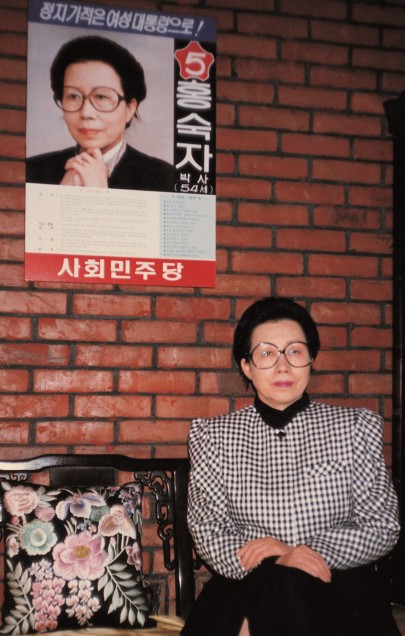
Hong’s influence extended into Korean politics. In 1980, she was one of the founders of the Socialist Democratic Party, and started to work for the party as vice-chairperson.[23] In 1987, the party nominated her as its candidate for the Korean presidency.[24] She was the very first Korean woman to run for the highest political office in the nation. Media outlets, including those from foreign nations, noted how unconventional it was for a woman to run for president.[25] The New York Times and Los Angeles Times, for instance, publicized her candidacy.[26] However, before the election, Hong bowed out of the race. She explained that she never intended to become the Korean president.[27] She was aware that the Social Democratic Party was not big and influential enough to make her president of South Korea, and she also acknowledged that it would not be possible for her to be elected president insofar as Korea was still a male-dominated society. Nevertheless, Hong believed it was meaningful for a Korean woman just to run in the election.[28] Certainly it drew global attention and changed Koreans’ perspective on women.
Hong Suk Ja devoted her life to Korean women’s rights when few people paid attention to the issue. Her contributions impacted Korean society and even broadened Korean women’s influence at the international level. In 2012, South Koreans elected Pak Geun-hye, the first female president in the country’s history. The moment was significant, but really unimaginable if not for Hong Suk Ja. Years before, Hong had jolted male-dominated Korean society and expanded the country’s imagination concerning what a woman could do. She pioneered new roles for Korean women by becoming the first female Korean diplomat and by being the first Korean woman to run for the presidency.
[1] Sook Ja Hong, Jeo nopeun goseul hyanghayeo (Toward the High Place), (Seoul: Yeobaek Media, 2006), 76.
[2] Ibid, 90-91, and 96.
[3] “Hong Sook Ja dongmun, Cheon New York chong yeongsakwan buyeongsa (Alumnae Sook Ja Hong, Former Vice-consul of the Consulate General of the Republic of Korea in New York),” Dongguk University Newspaper, May 21, 1970, accessed September 21, 2015, http://www.dgupress.com/news/articleView.html?idxno=19054
[4] Hong, Jeo nopeun goseul hyanghayeo (Toward the High Place), 97.
[5] Ibid, 101
[6] Ibid, 101-104; Sook Ja Hong, “Hankuk choecho ui yeosung oekyokwan (The First Korean Female Diplomat),” in
Oekyokwan samsipsamin ui hoesang (The Recall of Thirty-Three Diplomat), ed. Hojung Choe et al. (Seoul: Yeokang Press, 2002), 223.
[7] Hong, Jeo nopeun goseul hyanghayeo (Toward the High Place), 110-112.
[8] Ibid., 116
[9] Hong, “Hankuk choecho ui yeosung oekyokwan (The First Korean Female Diplomat),” 223.
[10] Hong, Jeo nopeun goseul hyanghayeo (Toward the High Place), 124-125.
[11] Hong, “Hankuk choecho ui yeosung oekyokwan (The First Korean Female Diplomat),” 224.
[12] Hong, Jeo nopeun goseul hyanghayeo (Toward the High Place), 127-130.
[13] “Hongiljeom oekyokwan imjiro (The Appointment of the Only Female Diplomat),” The Dong-A Ilbo, October, 18, 1965, accessed September, 25, 2015, http://newslibrary.naver.com/viewer/index.nhn?articleId=1965101800209204017&editNo=2&printCount=1&publishDate=1965-10-18&officeId=00020&pageNo=4&printNo=13536&publishType=00020
[14] Hong, “Hankuk choecho ui yeosung oekyokwan (The First Korean Female Diplomat),” 227.
[15] Sook Ja Hong, “Oekuk yeoseongdeul ui jeokeuk chamjeon (Foreign Women’s Active Participation in Government),” The Dong-A Ilbo, March, 29, 1971, accessed September 30, 2015, http://newslibrary.naver.com/viewer/index.nhn?articleId=1971032900209206007&editNo=2&printCount=1&publishDate=1971-03-29&officeId=00020&pageNo=6&printNo=15222&publishType=00020
[16] Hong, Jeo nopeun goseul hyanghayeo (Toward the High Place), 159-160.
[17] Eunhui Hong, “Segyeyeoseong danchehyeop buhoejang e seonchuldoen Hong Sook Ja ssi (Sook Ja Hong who was Elected the Vice President of the International Council of Woman,” The JoongAng Ilbo, September 24, 1982, accessed October 2, 2015, http://news.joins.com/article/1655139
[18] “Segyeyeoseong danchehyeopuihoe Hong Sook Ja ssi seonchul (Sook Ja Hong was Elected the President of the International Council of Woman,” The Dong-A Ilbo, April 26, 1986, accessed October 4, 2015, http://newslibrary.naver.com/viewer/index.nhn?articleId=1986042600209202017&editNo=2&printCount=1&publishDate=1986-04-26&officeId=00020&pageNo=2&printNo=19866&publishType=00020
[19] Sook Ja Hong, Tto hanaui Jipyeongseoneul neomeoseo (Over Another Horizon), (Seoul: Uil munhwasa, 1975), 225; Hong, Jeo nopeun goseul hyanghayeo (Toward the High Place), 160; and “Sae yeoseonghoe leul injeong yeoseongdanche hyeopuihoe (The Korean National Council of Women Admitted the New Women’s association),” Maeil Business Newspaper, August 10, 1973, accessed October 5, 2015, http://newslibrary.naver.com/viewer/index.nhn?articleId=1973081000099208014&editNo=1&printCount=1&publishDate=1973-08-10&officeId=00009&pageNo=8&printNo=2288&publishType=00020
[20] Hong, Jeo nopeun goseul hyanghayeo (Toward the High Place), 161.
[21] “Yeoseongkye (Women),” The Dong-A Ilbo, October 06, 1983, accessed October 08, 2015, http://newslibrary.naver.com/viewer/index.nhn?articleId=1983100600209207005&editNo=2&printCount=1&publishDate=1983-10-06&officeId=00020&pageNo=7&printNo=19079&publishType=00020
[22] “Seongjangbaljeon gaeseonjakeop yugongja 16myeongeul posang (Rewarding Sixteen contributors for the growth, improvement, and development of Korean society),” Maeil Business Newspaper, March 17, 1983, accessed October 23, 2015, http://newslibrary.naver.com/viewer/index.nhn?articleId=1983031700099202012&editNo=1&printCount=1&publishDate=1983-03-17&officeId=00009&pageNo=2&printNo=5241&publishType=00020; and Huijin Cheon, “Hankuk yeoseong danchehyeopuihoe, je 44hoe jeonkukyeoseong daehoe gaechoe (The Korean National Council of Women held the 44th national women’s conference),” The Women’s News, November, 07, 2008, accessed, October 12, 2015, http://www.womennews.co.kr/news/38145#.ViVffX4veUn
[23] “Minsa Shinjeongdang changdang seoneon (Creating a New Party, the Social Democratic Party),” The Dong-A Ilbo, December 05, 1980, accessed October 13, 2015, http://newslibrary.naver.com/viewer/index.nhn?articleId=1980120500209201010&editNo=2&printCount=1&publishDate=1980-12-05&officeId=00020&pageNo=1&printNo=18207&publishType=00020
[24] James E. Hoare, Historical Dictionary of the Republic of Korea, (New York: Rowman & Littlefield, 2015), 204.
[25] Spencer Sherman, “First Female Candidate Breaks All the Rules,” The United Press International, November 26, 1987, accessed October 15, 2015, http://www.upi.com/Archives/1987/11/26/First-female-candidate-breaks-all-the-rules/8971564901200/
[26] Sam Jameson “Korean Candidate Battles a Male-Dominated Society,” The Los Angeles Times, November 27, 1987, accessed October 15, 2015, http://articles.latimes.com/1987-11-27/news/mn-16665_1_party-chairman; and Clyde Haberman, “The Woman in the Race Gives Korea a Jolt,” The New York Times, November 26, 1987, accessed August 21, 2015, http://www.nytimes.com/1987/11/26/world/the-woman-in-the-race-gives-korea-a-jolt.html
[27] Daivd Holley, “Kim Young Sam Gets Backing of Only Woman in Korea Race,” The Los Angeles Times, December 06, 1987, accessed October 15, 2015, http://articles.latimes.com/1987-12-06/news/mn-27127_1_kim-young-sam
[28] Hong, Jeo nopeun goseul hyanghayeo (Toward the High Place), 191.
Written by: Younghwa Kim
Edited by: Daryl Ireland